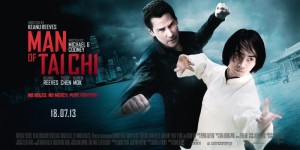Man of Tai Chi
太极侠
China/US, 2013, colour, 2.35:1, 104 mins.
Director: Keanu Reeves.
Rating: 4/10.
Pedestrian action vehicle for stuntman Chen Hu is basically ancillary fare.
Hong Kong, the present day. Following a tip-off about an illegal underground fighting ring run by wealthy American businessman Donaka Mark (Keanu Reeves), head of Hong Kong-based Security System Alliance, Sun Jingshi (Mo Wenwei), a chief inspector with the Organised Crime & Triad Bureau, leads a raid on a building, only to find it empty. She’s carpeted by her boss, Huang (Simon Yam), who shuts down the case. Meanwhile, Donaka Mark personally kills his star fighter, Zhide (Yu Seung-jun) – who was  Sun Jingshi’s informant – for failing to finish off his opponent. Looking for another “warrior” he can mould, Donaka Mark notices on TV Chen Linhu (Chen Hu), a taiji specialist who’s making a mark at the 23rd Chinese Wu Lin Wang Championships in Beijing. Chen Linhu, who works for a courier service during the day, is always being told by his teacher Yang (Yu Hai) to control his feelings and channel his qi. Donaka Mark flies Chen Linhu to Hong Kong, where he tests him out with various combatants and then offers him a job. Chen Linhu turns him down, considering fighting for money to be dishonourable, and returns to Beijing. However, when Yang’s temple in Hebei province is threatened with closure for being structurally unsafe, he accepts Donaka Mark’s offer in order to pay for the repairs. Donaka Mark regularly flies Chen Linhu to Hong Kong; the fights are broadcast to an elite group of wealthy subscribers. Meanwhile, Sun Jingshi, who has privately continued to work on Donaka Mark’s case, comes across Chen Linhu. However, one night, during a celebrity fight before an invited audience, Chen Linhu allows his anger to get the better of him.
Sun Jingshi’s informant – for failing to finish off his opponent. Looking for another “warrior” he can mould, Donaka Mark notices on TV Chen Linhu (Chen Hu), a taiji specialist who’s making a mark at the 23rd Chinese Wu Lin Wang Championships in Beijing. Chen Linhu, who works for a courier service during the day, is always being told by his teacher Yang (Yu Hai) to control his feelings and channel his qi. Donaka Mark flies Chen Linhu to Hong Kong, where he tests him out with various combatants and then offers him a job. Chen Linhu turns him down, considering fighting for money to be dishonourable, and returns to Beijing. However, when Yang’s temple in Hebei province is threatened with closure for being structurally unsafe, he accepts Donaka Mark’s offer in order to pay for the repairs. Donaka Mark regularly flies Chen Linhu to Hong Kong; the fights are broadcast to an elite group of wealthy subscribers. Meanwhile, Sun Jingshi, who has privately continued to work on Donaka Mark’s case, comes across Chen Linhu. However, one night, during a celebrity fight before an invited audience, Chen Linhu allows his anger to get the better of him.
REVIEW
Though it comes with a “China-US co-production” label, and a Hollywood name attached, Man of Tai Chi 太极侠 is a remarkably shoddy production, hardly above a direct-to-video action movie in quality. Animated by some lively fighting by Sichuan-born martial artist Chen Hu 陈虎, but otherwise a pedestrian slog through a totally generic script, Keanu Reeves’ directorial debut looks likely to end up on ancillary – where it belongs – in most western markets and even some in Asia.
The film is actually the second attempt by Reeves to launch his tutor and friend Chen, whom he got to know while shooting the Matrix trilogy (1999-2003), on which Chen worked as a stuntman under Hong Kong veteran Yuan Heping 袁和平. The first, Kung Fu Man 功夫侠, which Reeves just co-executive produced, was shot in southern China in late 2009 and was finally released in 2013, two weeks after Tai Chi opened in Mainland cinemas. Where Kung Fu is family action fodder that knows what it is, with Chen’s smalltown hero saving a boy from being kidnapped, Tai Chi aims at a more adult market, with Chen as a talented but flawed taiji enthusiast who’s lured into an underground fight club controlled by a wacko North American millionaire (Reeves) with some kind of warrior obsession.
Shot in both China – where Chen’s hero lives a clean life as a parcel courier and taiji student – and Hong Kong – where all the crime and illegal fighting take place – Tai Chi is as retro in its soul as Kung Fu, looking back some 30 years to a simpler era of low-budget movies in which the martial artist and the action, rather than script or direction, were the stars. From the opening scene, the fights (and excuses for fights) keep coming and the diminutive Chen comes over as a versatile performer who, though showcased in a less whiplash style than in Kung Fu, makes up in agility what he lacks in beefiness. The problem is that, in action terms, he’s not strongly characterised and has no immediate signature: Yuan’s generally uninspired choreography pits him against a variety of other styles (MMA, taekwondo, etc.) but never shows either how taiji differs from them or how Chen’s hero has modified an essentially meditative, defensive skill into an aggressive one.
Given Reeves’ personal interest in martial arts, and the script’s occasional flirtation with guff about a “warrior spirit” and so on, it’s surprising that more time isn’t given to the nuts and bolts of taiji itself. The fight scenes are no more than fight scenes, staged OK but with no special waah! factor and no dramatic shape. In the weirdest decision of all, Indonesian action star Iko Uwais (Merantau, 2009; The Raid Serbuan maut, 2011) is wheeled on for what looks like the big finale, only to be ditched halfway in favour of a later, lamely staged face-off between Chen and Reeves’ characters – in which the audience is asked to believe that the lumbering westerner almost bests the Chinese champion.
Tai Chi is full of such half-baked ideas and decisions. Reeves’ own character, with a name like an anagram (Donaka Mark), simply acts tough, growls lines like “He has to learn”, “You owe me a life” or “Innocent!”, and is played at the actor’s stoniest best. Mo Wenwei 莫文蔚 [Karen Mok], holding the Hong Kong flag almost single-handedly as an OCTB detective, also acts tough, huffs and puffs a lot, and is left stranded for long stretches of the plot, never properly integrated. The China side doesn’t fare much better: real-life veteran wushu practitioner Yu Hai 于海 (from the early Mainland films of Li Lianjie 李连杰 [Jet Li]) gives some dignity to the role of Chen’s master but Ye Qing 叶青 (One Wrong Step 无底洞, 2011) is bland as the (very) token girlfriend. Chen himself shows no progress as an actor since Kung Fu, a blank, Puck-ish enigma who makes other Asian martial artists-turned-actors like Tony Jaa and Uwais look colourful.
Production values are average, with functional photography by veteran US d.p. Elliot Davis (Things To Do in Denver When You’re Dead, 1995; Twilight, 2008) and cleanly designed sets by p.d. Taneda Yohei 种田阳平 (The Flowers of War 金陵十三钗, 2011). The bare-bones script, which apparently took four years to develop, is by Irish-born writer-composer Michael G. Cooney, who previously wrote several video games. Light on logic and bare of character development, it has Chen flying back and forth between Beijing and Hong Kong at the drop of a hat, and Reeves’ villain escaping from Hong Kong by actually swimming to China. Really.
CREDITS
Presented by China Film Group (CN), Wanda Media (CN), Village Roadshow Pictures Asia (CN), Universal Pictures (US), Company Films (US). Produced by China Film Group (CN), Wanda Media (CN), Universal Pictures (US).
Script: Michael G. Cooney. Photography: Elliot Davis. Editor: Xu Hongyu [Derek Hui]. Music: Chen Guangrong [Comfort Chan]. Production design: Taneda Yohei. Art direction: Fu Yingzhang, Kitagawa Miyuki. Costume design: Joseph A. Porro. Sound: Wang Dong, Piero Mura. Action: Yuan Heping. Martial arts: Chad Stahelski. Fights: Jon Valera. Stunts: Brahim Achabbakhe. Car stunts: Luo Lixian [Bruce Law]. Visual effects: Nataša Ljubisavljević (Base FX).
Cast: Chen Hu (Chen Linhu/Tiger), Keanu Reeves (Donaka Mark), Mo Wenwei [Karen Mok] (Sun Jingshi, OCTB chief inspector), Yu Hai (Yang, master), Ye Qing (Qingsha, Chen Linhu’s girlfriend), Ren Dahua [Simon Yam] (Huang, Sun Jingshi’s boss), Li Canchen [Sam Lee] (Deming), Hirata Yasuyuki (Donaka Mark’s assistant), Yu Seung-jun [Steve Yoo] (Zhide), Hou Yousheng (fighting monk), Brahim Achabbakhe (taekwondo fighter), Iko Uwais (Gilang Sunjaya, Indonesian fighter), Jeremy Marinas (MMA fighter), Tang Wenlong (Yuan, Sun Jingshi’s colleague), Helene Leclerc (fight MC), Steven Dasz (VIP).
Release: China, 5 Jul 2013; US, 18 Jul 2013.
(Review originally published on Film Business Asia, 5 Aug 2013.)
